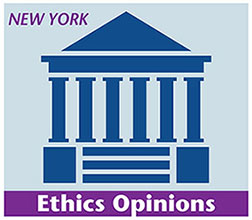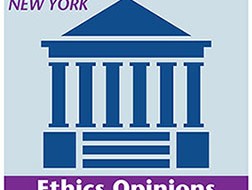Recent N.Y. Ethics Opinions: March/April 2017
By Tyler Maulsby, Associate, Frankfurt Kurnit Klein & Selz
Here are summaries of ethics opinions issued November 2016. The opinions were issued by the NYSBA Committee on Professional Ethics. NYLER will continue to provide updates on new ethics opinions issued by these and other ethics committees in New York State.
For information about how to obtain an ethics opinion from the NYSBA Committee on Professional Ethics, please visit http://www.nysba.org/Ethics/.
NEW YORK STATE BAR ASSOCIATION OPINIONS
NYSBA Ethics Op. 1108 (Nov. 2016):
Referral to Third Party Financing Companies
Opinion 1108 addressed whether a lawyer may refer clients to a third-party financing company, so that the company could help the clients pay the lawyer’s fees. The potential financing arrangements would not be contingent on the outcome of the matters. The lawyer would pay the financing company either a one-time “registration fee” or a monthly “subscription fee.” Additionally, while the financing company would not pay the lawyer’s fees directly, the lawyer’s proposed arrangement with the financing company would allow him to receive a notification when the company disbursed funds to the client. The Opinion concluded that such an arrangement may be permissible subject to several caveats. First, under Rule 1.8(f), a lawyer “shall not accept compensation for representing a client, or anything of value related to the lawyer’s representation of the client, from one other than the client” unless (i) the client gives informed consent; (ii) the arrangement with the third party does not interfere with the lawyer’s professional independent judgment; and (iii) the lawyer adequately protects the client’s confidential information. Opinion 1108 reasoned that the lawyer was subject to Rule 1.8(f) because he was receiving “something of value” from the financing company when he received information that funds were disbursed to the client, which were ostensibly borrowed to pay the lawyer’s fees. The Opinion noted that it was possible the client could believe that the lawyer was exercising “professional judgment in recommending a funding source appropriate for that particular client, or [that] the client might believe that lawyer has evaluated the loan terms.” If the lawyer believes that is reasonably likely, the Opinion reasoned, the lawyer should consider limiting the scope of his representation in accordance with Rule 1.2(c) to make clear that the lawyer is not advising the client about the potential financing options. The Opinion also concluded that in accordance with Rule 1.4(b), which requires the lawyer to reasonably explain a matter to the client, the lawyer should disclose to the client that he will have access to information regarding the status of the loan given that the client “might believe that dealings with the third-party financing company will be kept confidential.” Finally, the Opinion concluded that the registration or subscription fees paid by the lawyer to the financing company likely do not constitute improper “financial assistance” to a client under Rule 1.8(e). The Opinion reasoned that “[i]f these fees compensate the financing company for the risk of lending to the attorney’s potential clients, the lawyer’s payment of the fees would appear to be financial assistance to the clients… . On the other hand, if the purpose of the fees is to pay for the “portal” by which the lawyer can track the financing status of potential clients, that is something in which the client has no particular interest, and the financing company’s fees would not be financial assistance to clients.”
The full opinion is available at: http://www.nysba.org/CustomTemplates/Content.aspx?id=69519
NYSBA Ethics Op. 1109 (Nov. 2016):
Use of Pre-Paid Debit Cards to Transmit Funds to Clients
Opinion 1109 addressed whether a lawyer could transmit settlement funds to a client by way of a pre-paid debit card as opposed to a check. The Opinion responded to an inquiry from a lawyer who sought to offer clients, many of whom did not have a regular banking or checking accounts, an alternative to receiving a check where the client would then be required to pay a fee to a check-cashing service before receiving the settlement funds. The Opinion concluded that the use of a pre-paid debit card for this purpose did not violate the Rules provided that the lawyer obtained the client’s informed consent. The Opinion reasoned that Rule 1.15(c)(4)’s requirement that a lawyer promptly pay funds owed to the client “as requested by the client” means that the lawyer must “seek the client’s consent before using a pre-paid debit card to do so, as the inquirer intends to do.” Additionally, the Opinion reasoned, “Rules 1.4(a)(1)(i) & 1.4 (a)(2), and Rule 1.4(b) — each concerned with communicating with the client about matters material to the representation … obligate the lawyer to explain to the client, in the words of Rule 1.0(j), ‘the material risks of the proposed course of action and reasonably available alternatives.’” Finally, the Opinion noted that Rule 1.15(e) requires that all “special account withdrawals shall be made only to a named payee and not to cash. Such withdrawals shall be made by check or, with the prior written approval of the party, by bank transfer.” As a result, the Opinion reasoned, the lawyer must ensure that the pre-paid debit card issuer will accept payment from the lawyer by check or bank transfer and, if the latter, that the client approves the wire transfer in writing.
The full opinion is available at: http://www.nysba.org/CustomTemplates/Content.aspx?id=69522
NYSBA Ethics Op. 1110 (Nov. 2016):
Webinars and the Attorney Advertising Rules
Opinion 1110 addressed the attorney advertising rules in the context of a lawyer who sought to participate in and promote a series of webinars and live seminars. As a threshold question, the Opinion reasoned, if the “primary purpose” of the lawyer’s programs was the retention of new clients then it constituted an advertisement under Rule 1.0(a) and must therefore comply with the Rule 7.1, which governs attorney advertising. Additionally, if the seminar constituted advertising, certain methods of promotion may also constitute solicitation under Rule 7.3. The Opinion articulated a three-part test to make this determination: “(1) the intent of the communication, i.e., whether it is primarily educational or whether instead a substantial or significant purpose is to secure the retention of the lawyer or law firm publishing the newsletter; (2) the content of the communication; and (3) the targeted audience of the communication.” The Opinion reasoned, “[a]ssuming that the seminar and the communications used to publicize the seminar do not go beyond education to discuss the lawyer’s skills or reputation, or give other reasons to hire the inquirer, we believe they would not constitute advertising, and, therefore, would not involve solicitation.” If, however, the seminars went beyond educational purposes, the lawyer would be required to comply with the advertising rules. For instance, if the lawyer “included a pitch for his own services, it would constitute solicitation that is in-person or using real-time or interactive computer-accessed media” and would therefore generally be prohibited under Rule 7.3(a). Additionally, if the seminar invitations contain a “hiring pitch” or other advertising then the invitations must also comply with Rule 7.3 governing solicitations. Finally, the Opinion concluded that while the lawyer may charge for the seminars, he should make clear that he is not providing individualized legal advice in order to avoid the possibility that “the attendees may believe that their payments entitle them to receive legal advice.”
The full opinion is available at: http://www.nysba.org/CustomTemplates/Content.aspx?id=69536
DISCLAIMER: This article provides general coverage of its subject area and is presented to the reader for informational purposes only with the understanding that the laws governing legal ethics and professional responsibility are always changing. The information in this article is not a substitute for legal advice and may not be suitable in a particular situation. Consult your attorney for legal advice. New York Legal Ethics Reporter provides this article with the understanding that neither New York Legal Ethics Reporter LLC, nor Frankfurt Kurnit Klein & Selz, nor Hofstra University, nor their representatives, nor any of the authors are engaged herein in rendering legal advice. New York Legal Ethics Reporter LLC, Frankfurt Kurnit Klein & Selz, Hofstra University, their representatives, and the authors shall not be liable for any damages resulting from any error, inaccuracy, or omission.
Related Posts
« Ethical Implications of Emergent Technologies Practical Ethics Considerations for Lawyers Hired to Fix or Mitigate Another Lawyer’s Legal Malpractice »













